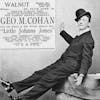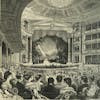COPYRIGHT PETER SCHMITZ 2024 - ALL RIGHTS RESERVED
[AITH OPENING THEME MUSIC]
Welcome back to Adventures in Theater History! Here on this show we bring you the best stories from the deep and fascinating history of theater in the city of Philadelphia. I’m your host Peter Schmitz. Our original theme music is by Christopher Mark Colucci.
This episode, once again I’m sharing a dramatic reading with you, from a historical book rather than my own research. That is because, well, I am more than a little swamped right now, and I’ll tell you why. I am thrilled to announce that I have a contract for a book - an actual printed book! - and that I’m working away at it like crazy this month. It’s all very exciting, and I will tell you all more about it when I get this manuscript submitted and approved. But don’t worry, because I have a special treat for all of you instead, I am giving you one of the show’s Bonus Episodes, normally available only to our Patreon supporters, for free. All I ask in return is that you consider becoming a financial supporter of the show on Patreon by going to Patreon.com/AITHPodcast.
Or, at the very least, please leave some stars and reviews of the show on Apple Podcasts or Spotify. Now, many people who have tried to do this have reported to me that this is actually not very easy to do, you have to just go through several hoops and levels on the Apple Podcast app just to leave a few nice words behind: “fun show! You’ll like it” on the app. Well, there’s a reason for that. Maybe you’ve heard about Artificial Intelligence and bots and trolls and so forth. They are getting better at evading procedures and CAPTCHA tests that are set up to stop them. I have had to turn off all the interactive features on our own website aithpodcast.com because I just was getting flooded with spam email addresses and sketchy pitches. But if you really want to keep getting accurately researched and original content from independent historians and podcasters like me, then this is worth doing. It’s really easy for AI to generate some reasonable sounding scripts and even the voices for podcasts like mine. In fact, they're probably scraping this podcast right now, and gathering my words so their predictive text algorithms can do it without me, in the near future. That’s just the way things are going. right now. The only way to prevent it, is to support my work, and the work of other podcasters like me, as much as you can, with real downloads, real reviews, real human voices. So take the time, leave a review, and it will help to make this show more visible and searchable in those good algorithms that still exist on the internet! Thank you so much for doing that.
All right. End of Rant. Now, on with the fun stuff.
[SEASON THREE THEME]
As I was researching Philly as a tryout town, I naturally turned to the 1933 Hollywood movie, 42nd Street, which explicitly has a whole sequence about a musical going down to Philly for a tryout. And as I looked into it, I learned that the movie (Which was later made into a Broadway musical itself) was in fact based on a sensational 1932 novel by a guy named Bernard Ropes. No we, don’t know much about this author, other than that he was born in Boston in 1905 and died in Wollaston, Massachusetts, in 1966, and that he seems to have been a Broadway dancer himself, working in the 1920s, but that later he started writing books about Broadway made showbiz novel something of a specialty: his books Stage Mother (1933) and Go Into Your Dance (1934), also backstage stories, were also made into movies about the same time as 42nd Street.
As the critic Richard Brody, writing in The New Yorker magazine in 2018, explained the plot of the book:
It brings the era and the milieu to life in a way that no movie I’ve ever watched and no nonfiction account I’ve ever read has done; it the ring of authenticity, the force of direct observation and conversation.
In the novel, Peggy [Sawyer] is a newcomer making her début, but she’s not naïve, as she is in the film: Ropes presents her as a New England minister’s daughter, sensible and principled, who—unlike the movie character—isn’t much of a dancer but possesses an air of unpretentious natural dignity and cultivation that distinguishes her from the run of hard-boiled “hoofers” dancing alongside her in the chorus. . . Ropes is keenly sensitive to the fate of young women like Peggy struggling to make their way in the theater. He depicts the casual pawings and salacious remarks and wolf whistles to which women are subject, and shows women pressured into sex with male directors and producers as a prerequisite—but no guarantee—for promotions. . .
The dance director of the musical, Andy Lee, is a serial philanderer who usually targets the women in his employ—and Peggy is warned about him by two women who are veterans of the chorus and who befriend her (their whisper network is a crucial form of solidarity). One of them advises her that it’s safe to accept his invitation to lunch but not to dinner: “ ‘But can’t a girl eat supper with a man without becoming immoral?’ Peggy inquired. ‘She probably can, but it isn’t worth the trouble because no one will believe her.’ ”
. . Yet Andy is presented as a notable figure of paradox—a skillful and original dance director, despite his crude ways, who was formerly renowned as “probably the greatest dancer the Ghetto had produced” (the “Ghetto” is the Lower East Side). . . . In the novel, the producers of “Pretty Lady” are Abe Green and Si Friedman, whose “Semitic” identity Ropes sneers at throughout [the book]. Julian Marsh, the “Pretty Lady” director—not a tough-talking American, as in the movie, but an Oxford aesthete—is also involved romantically with a member of the company: Billy Lawler, the “juvenile” lead. The novel suggests that he got his role only because of his relationship with Marsh, whom he holds in the grip of erotic passion and, as a result, is able to manipulate into firing other young gay men in the company. . .
So, thank you, Richard Brody! And with all that as set up - let’s now read from the novel. As this section of the book begins, the cast of the new Broadway show called “Pretty Lady” is about to have its very first preview performance in front of the Philadelphia audience. It sounds like they’re performing at the Shubert Theatre (later the Merriam, now the Miller) and that the company is all staying at the Ritz-Carlton Hotel (now the home of the University of the Arts.
The company of the show are all exhausted, because they’ve been rehearsing until dawn. The night before, an older actor in the company had literally died on the stage during the dress rehearsal. This had held things up considerably. But, the director Julian Marsh gives them a big The Show Must Go On Speech, and they all tumble into bed at the Ritz for a few hours sleep, before hustling back to the theater for the opening night. Everyone’s nerves are frayed and everyone is excited and everyone hopes the show will be a big success, because even though the book is set in 1927, before the Depression, everyone still needs this job badly.
I’ll do my best to do all the various voices in the book - there’s one section in particular where about 12 different women in the chorus speak, one after the other, without any indication of exactly who is talking. As the chapter begins, we are seeing the action from the vantage point of Abe Green, the producer, and he is observing from the house as the orchestra conductor Julius begins the overture on opening night. He also sees the choreographer Andy Lee out in the house with him as they both gauge the reaction of the crowd to the opening number. We also get to hear about Dorothy Brock - the ill-tempered leading lady of the musical, Pretty Lady. . Then the narration jumps back in time a little bit, and we watch the same events, but this time from behind the curtain, from the point of view of Peggy. Finally at the end we’re back out in the house, with the producer Abe Green again, nervously listening to the audience’s reactions.
Got it? Ok good, because here we go! Chapter Five of 42nd Street:
[MUSIC]
BOOK CHAPTER NOT TRANSCRIBED
[MUSIC ]
There you are - a great introduction to the atmosphere of our Season 3! Thank you for being a supporter of the show! And thank you for coming along on another Adventure in Theater History: Philadelphia!
[AITH END THEME]









